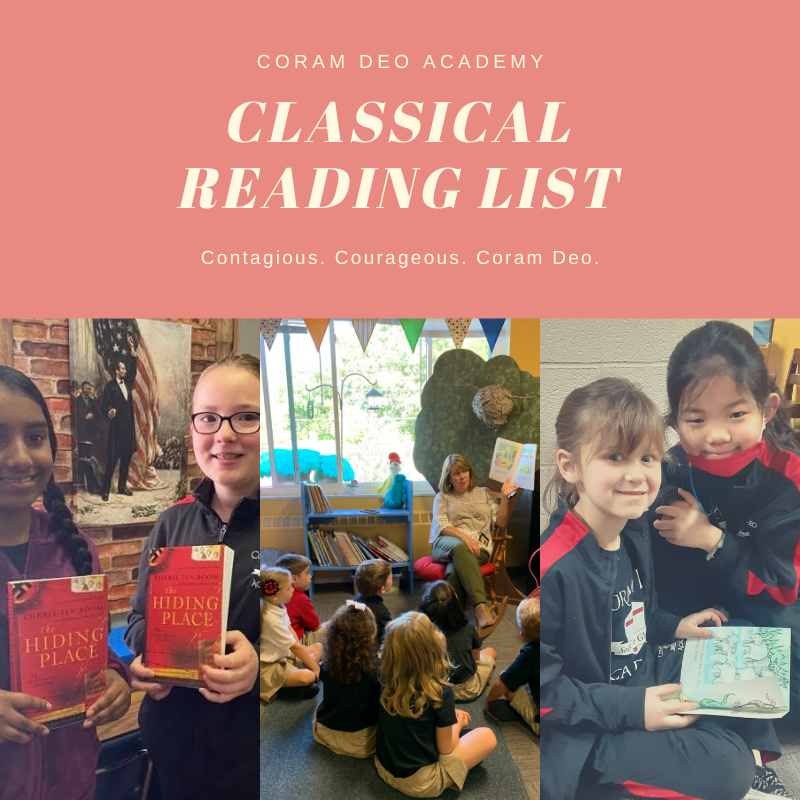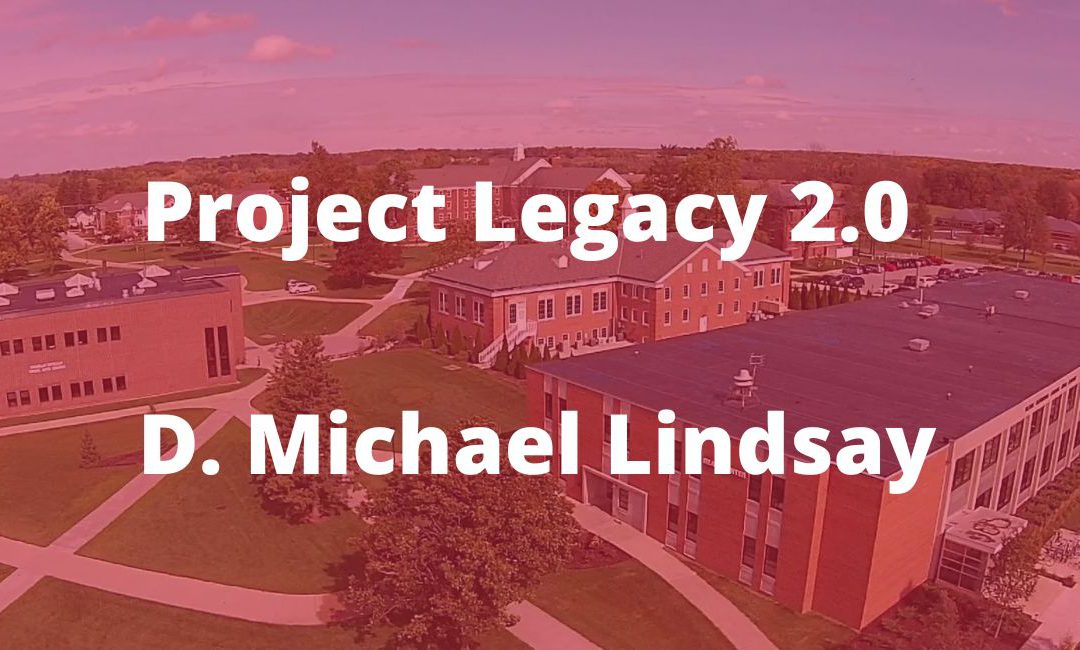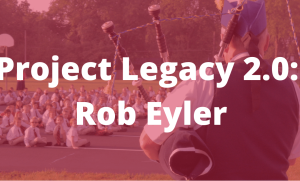by David Seibel, Head of School
Dr. Lindsay is the featured speaker at the Coram Deo Annual Banquet on October 28, 2022. We are grateful to have Dr. Lindsay join us to celebrate the 15th year of Coram Deo, the new building, and the bright future ahead.
In this Project Legacy 2.0 article, I sat down with the leader that inspired the Project Legacy article series, Taylor University President Dr. Michael Lindsay. The inspiration for the Project Legacy series came from Dr. Lindsay’s book, View from the Top, which includes interviews with US presidents and the heads of GE, JP Morgan, Chase, and Harvard.
When I first read President Lindsay’s book in 2014, I was in a desperate place, because I was the head baseball coach at a large public high school, and I felt far from qualified for the role. I was growing my family, helping plant a church, and feeling like I needed to grow as a leader. My threefold strategy for growing as a young leader was 1) reading books on organizational leadership, 2) interviewing senior leaders who had been impactful in their institutional callings, and 3) regularly asking God to put the right people in my path. Since then, View from the Top has been one of my home bases for thinking soberly about institutional leadership and even inspired me to complete my doctorate of education.
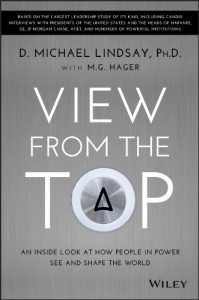
Dr. Lindsay is a helpful resource or example for leaders from industry, because he is a productive scholar, an experienced practitioner, and strategic problem solver. He is a Baylor grad and trained sociologist from Rice University so he understands the world of academics. He served as the president of Gordon College for a decade in an era where the College saw record years in fundraising, academic scholarship, and student discipleship, so he has lived the reality he studies and writes. Moreover, he is a strategic generalist that pulls together truths from a variety of different fields to create a synthetic strategy that brings out the best in all of his team (see full bio here https://www.taylor.edu/about/president/). He also understands and appreciates the classical tradition of education which is exciting for the state of Indiana.
In my conversation with Dr. Lindsay in his office in Upland, I asked him how he lives out the seven principles of his book View From the Top in his role at Taylor University. Below are some of the top insights from our conversation as well as significant quotes from the book.
#1 Act Personally, But Think Institutionally
“The Lord uses institutions for godly good,” shared Dr. Lindsay in our conversation. Institutions are multipliers of individual effectiveness, because they streamline the effectiveness of individuals’ gifts. They provide a platform for transformation at scale. For example, Taylor University is able to support K-12 institutions, the business sector, churches, and a host of other institutions, because of their many resources and vast network.
In View From the Top, Lindsay writes,
“A scholar lacks funding and legitimacy without her university” (16) and “Individuals are not helpless slaves to soulless corporations” (16).
People negatively associate the word institutions with the idea of being institutionalized and frown upon community-strengthening institutions like marriage, family, church, and other dense networks. Lindsay summarizes our dependence upon institutions when he writes,
“There is no civilization without institutions. I think that society can’t organize itself to do the most human things, the most important things, over a long-term basis without institutions.” (7)
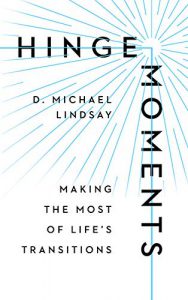
We also talked about how institutions face hinge moments, the title of his most recent book. In Hinge Moments, Lindsay describes how to make the most of those small windows of time that have an outsized impact on the rest of their lives. (Note! All visitors to the CDA Annual Fall Banquet will receive a free copy!) We understand hinge moments individually when we consider key relationships in college or major career transitions that happened in a flash but have lasting impact. These sorts of hinge moments happen in institutions too; I have experienced this as Coram Deo has changed campuses going into year 15 while also adding a high school.
#2 Leadership Begins at 20
“So many parents are trying to buffer kids and Covid made it worse— kids need to be exposed to more risk, failure, and challenge. They need to experience the struggle; parents fear the struggle for their kids,”
shared Lindsay. I could not agree more with Dr. Lindsay’s sentiment here. The road to resilience is full of problems and that pathway is full of pain and struggle. This is not a call to have our students crawl over broken glass, but it is a reminder that God often increases our joy in Him and our competence through trials (see James 1:2). Lindsay writes,
“The best way parents can groom their children for success is to let them develop passions and perspective through the normal challenges and trials of childhood. They don’t need a silver spoon.” (34)
For many of us, these difficulties occur during the college years or soon after. Lindsay writes,
“For most platinum leaders, this fork in the road appeared during or soon after graduate school. They began to separate from the herd by keeping a broad, liberal arts approach to life while continuing to develop the skills related to their fields. The ability to maintain a generalist orientation—one that sees beyond the narrow scope of the specialist—while increasing mastery in a specific field distinguishes platinum leaders from mere scholars.” (30)
In an age where employers like Google and Amazon are down-credentialing, a college degree is becoming less necessary. This places a downward pressure on K-12 education to get kids ready for the workforce. However, we must heed Lindsay’s dictum to not overspecialize too soon. C.S. Lewis makes the same point when he writes,
“When education becomes training, we lose civilization.”
This just means that education is part of God’s formula to make us more fully human, not just to prepare us for work. K-12 education should not just be for college and career preparation, but for life.

#3 More Breadth, Less Depth
Dr. Lindsay has devoted much of his academic life to understanding the education and preparation of the most effective leaders in the world and has found that there are a few trustworthy catalysts. One of them is the White House Fellowship, Lindsay writes,
“The White House Fellowship is an environment teeming with leadership life, giving a select few access to superior networks and the broad-minded perspective they need to direct a major enterprise.” (41)
Lindsay found that the Fellows were two and half times more likely to reach the pinnacle of organizational life based upon their experience in the Fellowship. The theory behind the Fellowship is that leadership is better caught than taught.
Lindsay’s insights about the White House Fellowship were what led us to form the Apprenticeship at Coram Deo Academy. During the Apprenticeship, upperclassmen gain three beyond-the-classroom experiences with local employers to learn about life in the workplace. These three workplace experiences are designed to reinforce the lessons learned in the classroom. Students are paired with organizational partners that match the career pathway that the student is considering.
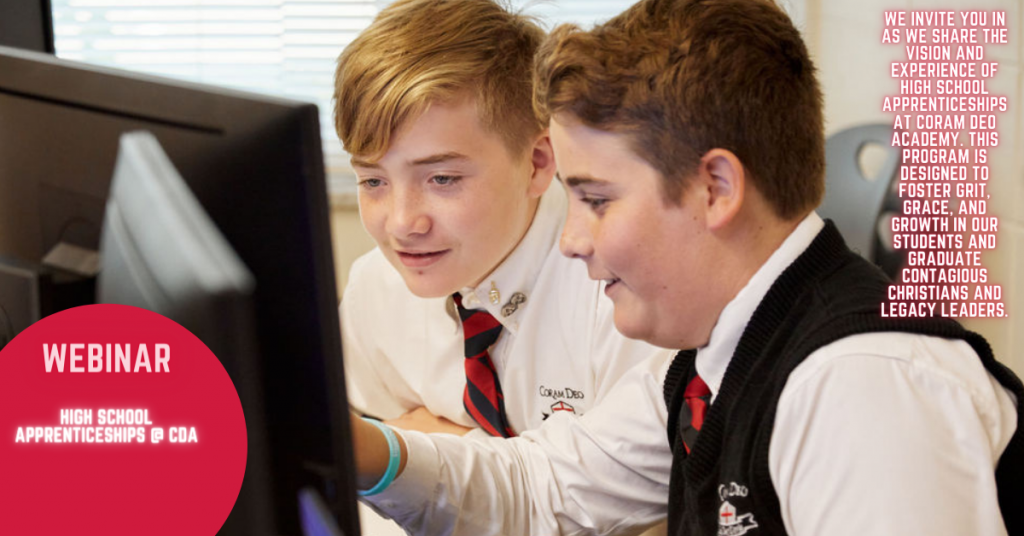
#4 The Essence of Leadership
As a Head of School, I receive a lot of critical feedback over the course of the year and I asked how Dr. Lindsay handles this as a college President. He shared,
“Almost always there’s a kernel of truth—filter to find the kernel of truth.”
Healthy communities are marked by productive conflict that integrates and unites the community rather than dividing it. This is interesting, because Lindsay is not a fan of consensus decision-making within communities. Lindsay quotes another university president,
“We aim for consultative decision processes, not consensus decision processes, because with consensus decision processes, you’ll never get there.” (69)
He also quotes former Attorney General John Ashcroft on consensus in leadership,
“Consensus is the enemy of leadership. If you’re only taking people where they’re already going, you might as well be a bus driver… A leader does more than just drive people to a destination to which they are already headed… a leader either takes you where you weren’t—where you hadn’t had the idea of going—or gets you to a previously understood noble destination at a pace which would have been otherwise impossible.” (69)
#5 Strength in the Crucible of Crisis
In speaking of the benefits of the Taylor faith and learning community, Dr. Lindsay shared,
“Part of it is by exposing them to teachers who are vulnerable about their own struggles and pains that they have experienced. We all need networks of support to process life’s difficulties, someone that we can trust and that can come alongside.”
Crises have a way of showing how we cannot handle life on our own. Lindsay writes,
“Like Icarus flying too close to the sun, leaders in crisis can plummet quickly. These crises can result from their own pride and misconduct or simply the unavoidable events of the world around them. But the crucible of crisis does not always destroy. It also provides an opportunity for leaders to prove their mettle and emerge stronger than before.” (79-80)
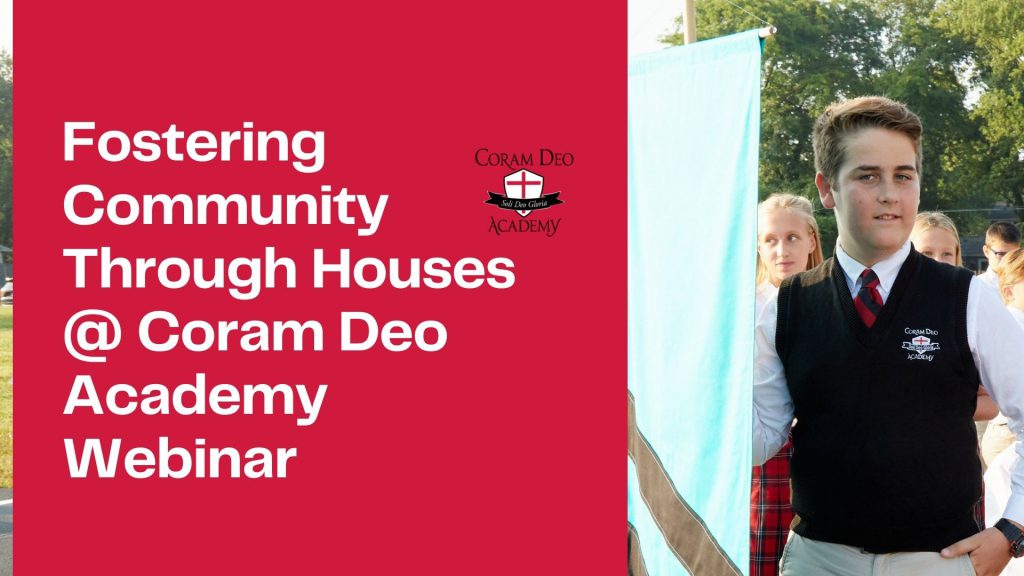
Click above to learn about how we foster leadership and community through Houses at Coram Deo Academy!
#6 Lead With Your Life
I noticed that Dr. Lindsay’s office was very tidy and his desk was also very neat. He mentioned that his home was as well and said,
“Every leader must figure out those few variables that make them a better person—I do not like clutter so I build systems, so that I can achieve and that make me more likely to build a better version of myself.”
Dr. Lindsay is able to manage a thriving university while also parenting his school-age children because he has developed rhythms that catalyze his leadership. In View From the Top, he writes of a businessman who said,
“One of the things I learned early on is my teenage children didn’t care where I was at 5 a.m.” (107)
I’ve used this quote to lead Coram Deo by developing a practice of regularly waking up at 3 or 4 in the morning to stay on top of my various responsibilities at home and at work.
#7 Lead for Good
In this section of View From the Top, Lindsay shares insightful perspective on the rise of fundraising in Higher Education. He writes,
“The overwhelmingly most popular giving cause was education, with 66 percent of the leaders giving to educational causes, largely colleges and universities.” (126)
Dr. Lindsay is well-known for receiving the largest gift, over $100M, to a private Christian liberal arts college. When I asked him how he cultivated a spirit of generosity, he shared,
“Before receiving that substantial gift of generosity, I had prayed for four years that someone would make a transformative gift that changed Gordon’s future.”
I can say that I have prayed that same prayer for Coram Deo Academy since Dr. Lindsay shared about the power of prayer to lead to extravagant generosity.
I could not be more excited about Dr. Lindsay’s arrival in Indiana, and I am thrilled to have him celebrate our 15th year at Coram Deo Academy at our annual banquet on October 28th, 2022.
Classical Reading List
